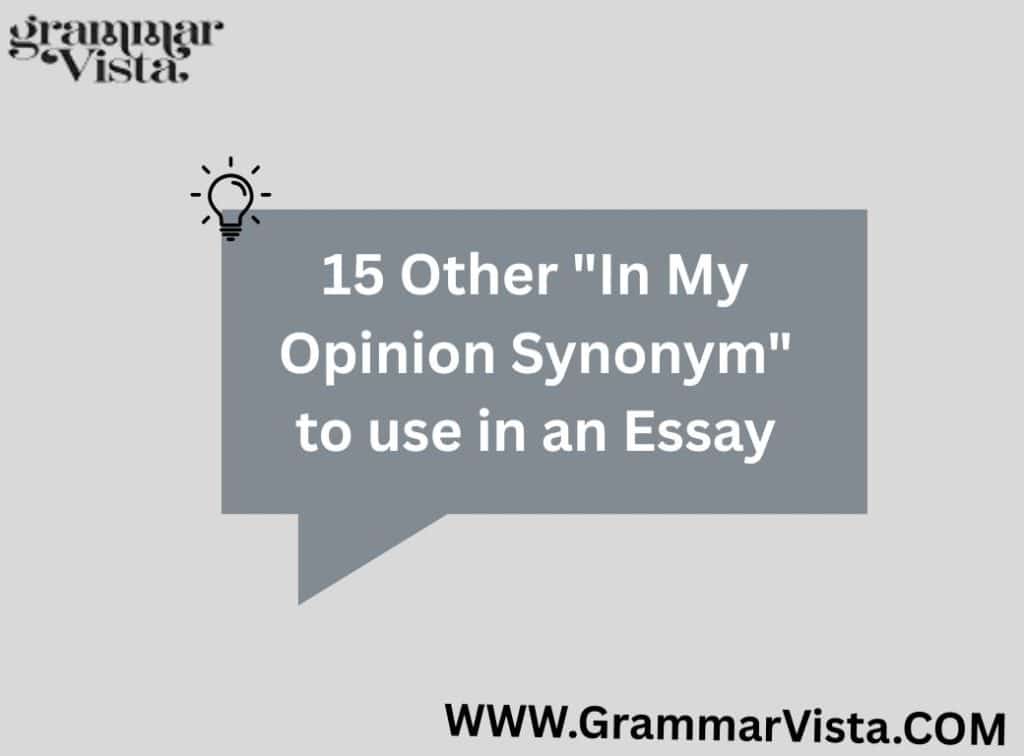Have you ever felt like your essays are stuck in a rut, using the same phrases over and over again? Many writers rely on “in my opinion” to express their thoughts, but this common phrase can dull the impact of your argument. The main question arises is How to say in my opinion in an essay?
In this reading, we’ll explore 15 Other “In My Opinion Synonym” to use in an Essay that can enhance your writing and help convey your viewpoints more effectively. From phrases like “from my perspective” to “personally, I feel,” you’ll discover another way to say in my opinion to articulate your beliefs and engage your readers.
From My Perspective
From my perspective, the phrase “in my opinion” can often feel overused and somewhat redundant. By opting for alternatives like this one, writers can inject their voice into their essays while also inviting readers to consider a broader spectrum of insights.
Each individual brings a unique viewpoint shaped by personal experiences and cultural backgrounds, which enriches the discourse. When you say “from my perspective,” it underscores the subjective nature of your argument, allowing readers to appreciate the diversity of thought that exists around any given topic.
I Believe
When expressing personal viewpoints in an essay, using the phrase “I believe” conveys your stance and encourages openness and respect in the conversation. This phrase acts as a gateway to deeper understanding, inviting readers to engage with your perspective while recognizing that opinions can vary.
By stating “I believe,” you signal that your assertion is rooted in personal conviction, which fosters a more inclusive dialogue. Articulating your beliefs offers an opportunity to explore the nuances of your argument. It allows you to present your reasoning and experiences that shape your viewpoint, creating a richer narrative.
Personally, I Feel
Personally, I feel serves as a powerful tool for conveying individual sentiments in an essay. This phrase invites readers into the author’s subjective world, signaling that what follows is a unique interpretation rather than an objective fact.
By using this expression, writers can establish a connection with their audience, creating a space where personal reflections are welcome and encouraged. It transforms the writing from mere analysis to a shared dialogue, making the reader more invested in the argument being presented.

Incorporating “personally, I feel” into your essay can enhance its relatability. When authors express their thoughts this way, it humanizes their arguments, allowing others to see the emotional and experiential basis behind their perspectives.
It Seems to Me
“It seems to me” serves as a nuanced expression that invites readers into the personal realm of your thoughts while maintaining an air of humility. This phrase indicates that what follows is not merely a statement of fact but rather a subjective analysis shaped by your experiences and beliefs.
By using this expression, you establish a conversational tone, encouraging the audience to consider your perspective without feeling confronted by an absolute claim.
This phrase allows for personal insights to shine through, making your argument more relatable. It subtly acknowledges that different viewpoints exist, creating a space for dialogue rather than debate. When you say “it seems to me,” you’re not just sharing your opinion; you’re extending an invitation for others to reflect on their own interpretations and experiences related to the topic at hand.
In My View
In my view, utilizing alternative phrases to express personal opinions can enrich your writing and foster a more well-rounded discussion. Phrasing like “I believe” or “It seems to me” opens the door for subjective analysis, allowing the author to convey their thoughts while encouraging readers to consider multiple perspectives.
This approach personalizes the argument and also enhances the essay’s engagement level, as it invites readers to connect with the author’s unique insights.
Employing diverse expressions such as “From my perspective” or “I would argue that” enables the writer to present their stance with confidence, while still acknowledging that differing viewpoints exist. This fosters an environment where personal insights can be shared without hesitation, ultimately leading to a richer dialogue on the topic.
I Would Argue
Using the phrase “I would argue” personalizes your viewpoint and establishes a foundation for the ensuing discussion. This phrase conveys confidence in your perspective while inviting readers to consider your reasoning.
By framing your thoughts in this way, you signal that what follows is not just a casual opinion but a well-considered argument backed by evidence and logic.
Employing this phrase encourages the use of persuasive techniques that can enhance your overall argument. It prompts you to delve deeper into your claims, encouraging a robust exploration of counterarguments and supporting evidence.
To My Mind
“To my mind” serves as an effective phrase for introducing personal opinions, allowing the writer to convey their perspective with confidence. This expression personalizes the statement and also invites readers to engage with the writer’s reasoning.
By framing thoughts in this way, writers can enhance critical thinking by encouraging others to consider how subjective perspectives shape our understanding of complex issues.

Using “to my mind” can create a sense of dialogue between the writer and the audience. It suggests an openness to discussion, inviting readers to reflect on their own viewpoints while weighing the writer’s insights. This can lead to a richer exploration of the topic at hand, making essays more engaging and thought-provoking.
As I See It
As I see it, the phrase “as I see it” serves as a powerful tool for writers looking to infuse their essays with personal perspective. This expression allows writers to introduce their personal insights without diminishing the academic rigor of their arguments.
By framing opinions in this way, the author subtly invites readers into their thought process, making the argument feel more relatable and engaging. It creates a bridge between subjective interpretation and objective analysis, enhancing the overall persuasive impact of the writing.
Using “as I see it” can also encourage a more conversational tone, allowing readers to connect with the writer on a human level. This connection is essential in academic writing, where the risk of sounding overly formal can alienate audiences.
In My Estimation
In my estimation, the phrase itself signals a nuanced acknowledgment of personal bias while maintaining a commitment to rational argumentation. By using this expression, writers convey their perspective and also invite readers to consider the subjective nature of their claims.
It encourages a dialogue that recognizes differing viewpoints and underscores the importance of critical thinking in discourse.

This phrase can effectively serve as a bridge between personal belief and factual evidence, allowing authors to assert their stance without dismissing the validity of other opinions. By framing their thoughts in this way, writers can foster a more inclusive discussion, prompting readers to reflect on how personal experiences shape their understanding of complex issues.
I Contend
Using the phrase “I contend” in your writing signals a strong belief in the validity of one’s argument, establishing an assertive tone that engages the audience. This phrase conveys not just personal opinion but a reasoned assertion, inviting readers to consider your perspective as a well-founded claim rather than a mere subjective view.
When you use “I contend,” you position yourself as a critical thinker who is ready to defend your stance with logical reasoning and evidence, fostering a sense of credibility.
“I contend” encourages deeper engagement from your audience, prompting them to reflect on their own beliefs and the foundations of your argument. By framing your assertion this way, you create a dialogue that transcends simple opinion-sharing; it becomes a call for discussion and critical analysis.
My Interpretation Is
My interpretation is a phrase that embodies the essence of subjective analysis, allowing the writer to convey personal insights without imposing them as absolute truths. By using this expression, you invite readers into your thought process, creating a space for dialogue rather than dictation.
It signifies a willingness to present a subjective analysis that reflects personal insight, fostering an atmosphere where differing perspectives can coexist and be explored.
When you frame your arguments with “my interpretation is,” it highlights your unique viewpoint and encourages others to consider their own interpretations. This approach enriches the discussion, inviting readers to engage more deeply with the text.
I Hold the Opinion
“I hold the opinion” serves as a powerful declaration of personal belief, similar to stating one’s interpretation of a complex issue. This phrase conveys a sense of ownership over the thought being expressed and invites readers to consider the perspective being presented.
By using this phrase, you establish a clear stance that encourages deeper engagement with your arguments, prompting readers to reflect on their own viewpoints in relation to yours.
Saying “I hold the opinion” suggests a thoughtful deliberation behind your statement. It indicates that your perspective is not merely a fleeting thought but rather a considered judgment shaped by experience or research.
I Am Convinced
Using the phrase “I am convinced” allows for a robust expression of personal conviction while acknowledging the subjective reasoning behind one’s view. This phrase goes beyond mere opinion; it conveys a sense of certainty that can strengthen your argument and engage your reader.
By stating that you are convinced, you invite others to consider the evidence or rationale that has led you to your conclusion, creating a bridge between personal belief and analytical reasoning.

This expression fosters a connection with your audience. It suggests that your viewpoint is not just an isolated thought but is rooted in thoughtful consideration and reflection. This level of engagement can encourage readers to explore the reasoning behind your conviction, prompting them to reflect on their own beliefs.
From Where I Stand
From where I stand, the phrase “in my opinion” opens a window into the writer’s personal perspective, creating a bridge between subjective thoughts and objective analysis. This expression serves as a gateway to sharing one’s personal stance on an issue, allowing for the articulation of a subjective viewpoint without diminishing the importance of evidence-based arguments.
By adopting this phrase, writers assert their individuality and invite readers to consider their unique lens on the topic at hand.
Using “from where I stand” encourages a more conversational tone, fostering engagement and relatability. It suggests that the author is grounded in their beliefs yet remains open to dialogue and differing viewpoints. This approach can enhance the richness of an essay, transforming it from a mere presentation of facts into a dynamic discussion that respects the complexity of opinions.
One Might Say
When you use the phrase “one might say,” it introduces a level of nuance and thoughtfulness to an argument that invites readers to ponder various perspectives rather than simply accepting a singular viewpoint. This phrase subtly shifts the tone from a definitive statement to one that acknowledges the complexity of opinions.
By employing this expression, you create an atmosphere of dialogue, suggesting that there are multiple angles to consider, which enriches the overall discourse in your essay. Incorporating “one might say” also enhances your credibility as a writer.
It positions you as someone who is not only aware of differing viewpoints but is also willing to engage with them respectfully. This approach encourages readers to explore the subject more deeply, prompting them to reflect on their own beliefs in relation to yours.
Wrapping Up
Diversifying your language can significantly enhance the quality of your essays and make your arguments more compelling. By incorporating phrases such as “I believe,” “from my perspective,” or “it seems to me,” you can express your opinions in a more nuanced and engaging manner.
These other ways to say in my opinion in an essay demonstrate your writing skill and also invite readers to consider your viewpoint more thoughtfully. Remember, effective communication is key in academic writing, and the right phrasing can make all the difference. So, the next time you write an essay, challenge yourself to use these “in my opinion synonym” and elevate your writing to the next level!







